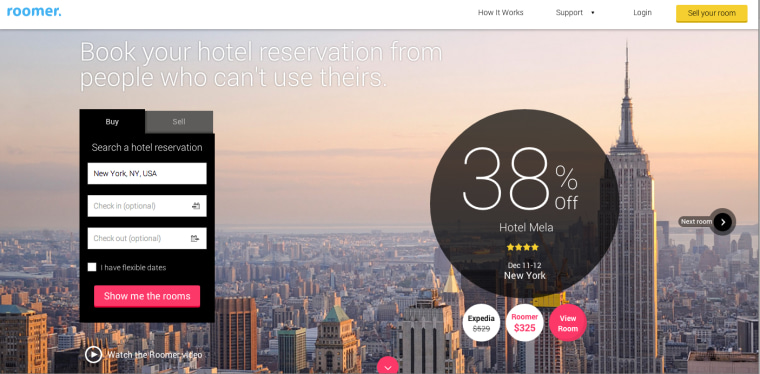Travel enough and it’s probably happened to you: You make a hotel reservation and get a lower price by paying a nonrefundable rate up front, only to discover that a change in plans means you can neither use the room nor get your money back.
Wouldn’t it be nice if there was a way to resell that reservation to someone else, recouping some of your money while allowing the buyer to snag a good deal? It would be like a StubHub for hotel rooms, which, in fact, is the premise behind a handful of websites that promise to provide such services.
“It happens more often than you might think,” said Richie Karaburun, managing director of Roomer Travel, who estimates that there are 80,000 no-shows at U.S. hotels every day, half of which are nonrefundable.
On Roomer, which launched this spring and expanded across the U.S. last week, it works like this: People with reservations they can’t use enter the details of their booking — such as name, dates, room type and confirmation number — and a price they’d like to get.
The site then confirms the reservation with the hotel and creates a listing, complete with photos and a description. If someone else books it, the site handles the name transfer, sends the buyer a confirmation e-mail and processes payment to the seller via PayPal or Western Union 10 days after the buyer checkout.
In order to facilitate sales, the site suggests sellers price their reservations at roughly 50 percent off. Currently, Roomer doesn’t charge a fee, although the above payment processors do, and the site is considering implementing a fee to sellers in the future.
For buyers, the site claims an average savings of 37 percent off regular retail prices, although the savings can be even greater when sellers are willing to settle for less. Based on some recent searches, you could book a two-night stay in late December at the Edison Hotel in New York for $110 per night vs. $203 on the hotel website or a four-night stay at the JW Marriott Las Vegas Resort, starting this weekend, for $49 per night vs. $139 on Marriott.com.
Obviously, buyers with more flexibility, such as those looking for a spontaneous getaway or those who don’t need to purchase last-minute airfare, have the most options. The site, along with competitors such as Cancelon and Hall St., will likely be less useful for those with set travel schedules as each listing is pegged to specific dates.
The market may be further limited by two other factors: Nonrefundable reservations represent only a small fraction of the overall hotel market — less than 10 percent, according to travel industry analyst Henry Harteveldt of Hudson Crossing — and the degree to which hotels are willing to participate.
Harteveldt, for one, is skeptical: “If a customer cancels, the hotel keeps 100 percent of the revenue and can still put that room back into inventory in any number of ways,” he said. Furthermore, many hotel companies take a dim view of third parties brokering the prices of their rooms.
“Many hotels would vehemently object to intermediaries creating a secondary marketplace for their rooms,” said Harteveldt. “I won’t be surprised if some attempt to take legal action.”
Karaburun maintains that’s not a problem, citing the fact that Roomer has already worked with more than 2,000 hotels and that the benefits of filling otherwise-empty rooms go beyond maximizing room rates.
“Empty rooms mean empty bars and restaurants, no revenue from room service or Wi-Fi,” he said. “Our users bring incremental revenue to the hotels and the hotels don’t have to spend any money to acquire them.”
Either way, it’s safe to say that sites like Roomer and its competitors represent yet another manifestation of the peer-to-peer business model that provides travelers with potential savings while upending traditional channels of distribution in the industry.
“Sites like this represent the next generation of opportunity for tech-savvy consumers to take advantage of low hotel room prices,” said John O’Neill, director of the School of Hospitality Management at Penn State. “Hotel pricing is becoming increasingly more transparent, first from OTAs (online travel agencies) like Expedia, and now from these sites operating in the secondary market.”
Or, as Karaburun puts it: “We want to create a marketplace where people can help each other while getting a good rate. It’s kind of a treat people as you want to be treated thing.”
Rob Lovitt is a longtime travel writer who still believes the journey is as important as the destination. Follow him on Twitter.
